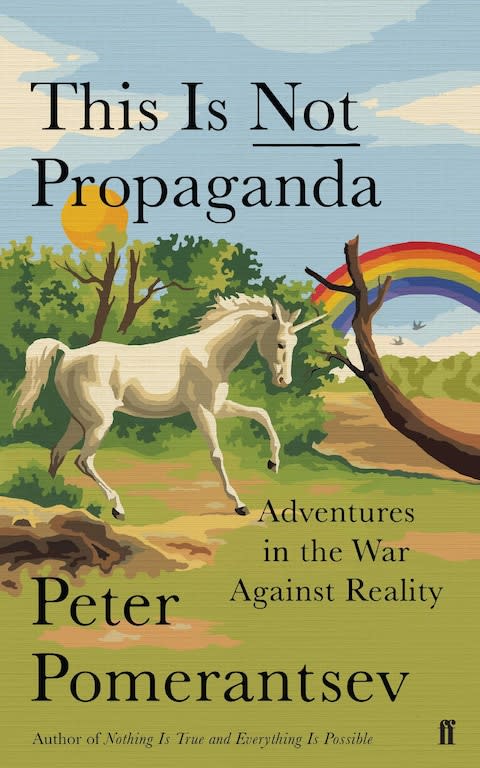How the age of information made us more susceptible to propaganda than ever

Tim Smith-Laing reviews This Is Not Propaganda by Peter Pomerantsev (Faber)
We live in an era of astonishing “information abundance”. Those of us who spend large chunks of our lives online have, at any given moment, an entire world of knowledge (and pseudo-knowledge) at our fingertips. From articles like this, in the online versions of good old-fashioned newspapers, to vast uploaded libraries of books and journals, the never-ending channel-hop of YouTube, and on to the endless scrolls of Twitter, Facebook, and a million million comment streams, it is all just a few clicks away.
In my own case – as a fairly distractible web user – it sometimes feels like I am trying to absorb it all at once. My browser currently has 26 tabs open, from a 1990 Esquire article on the Liberian civil war to my ever-filling email inbox. The ease and instantaneousness of it all is amazing and disorientating. Earlier today I pulled up a 16th-century Jesuit treatise on equivocation; when distraction kicked in, I found myself on Twitter reading live updates about a cruise ship brawl.

This is all wonderful, of course, but as Peter Pomerantsev notes in This Is Not Propaganda, it comes with a legion of problems. In the 20th century, the goal of free-flowing information was closely tied to the spread of democracy, education and accountability. Informed citizens, through knowledge alone, had the means to resist secretive governments and hold shady corporations to account, and participate in a public sphere where evidence and reason might – at least in the long term – trump rhetoric and propaganda.
Now that the flow is a torrent, though, matters are not so simple. “More information was supposed to mean mutual understanding,” Pomerantsev says wistfully, “but it has also made possible new and more subtle forms of conflict and subversion.” Through a doubly disappointing dynamic, the information deluge we live with seems not only to have made us “less capable of deliberation than ever”, but, simultaneously, to have handed “the powerful” myriad new ways “to crush and silence dissent”.
Such an assessment may sound either morbid or outright hysterical – not least because of the polarisation of opinions about the EU referendum and the election of Donald Trump, events in which the influence of (dis) information actors such as WikiLeaks, Cambridge Analytica and Russian trolls is undisputed but unquantifiable. But Pomerantsev has plenty to back up his bleak assessment of the situation.
Though he somewhat modestly describes himself as “a lapsed television producer” and disclaims the title of “academic”, he is an expert in the field. At the LSE’s Institute of Global Affairs, he runs a programme dedicated to analysing disinformation and the polarisation of global politics – a role that has seen him called as an expert witness to the US Senate and to various parliamentary committees here. Although This Is Not Propaganda is, by design, “not an academic work”, it is larded with facts, figures and interviews that bespeak years of investigation.

Added to this is Pomerantsev’s personal experience of the tactics that governments past and present have used to exert mental control over their citizens, and the modes of resistance citizens have employed in return. The son of two Soviet dissidents – one a poet and broadcaster, the other a documentary maker – with a long history of tangles with the KGB before entering into exile first in West Germany and then in England, Pomerantsev spent a decade living and working in television in Putin’s Russia. Chronicling his experiences in the excellent Nothing Is True and Everything Is Possible (2014), he diagnosed Putin’s regime as a “postmodern dictatorship”: a place in which the very notion of truth and facts melted into air, replaced by a carefully scripted “reality show” ruled by a bizarre mixture of arch irony and brutality.
Pomerantsev was notable for seeing in Russia’s internal processes the shape of things to come worldwide, and This Is Not Propaganda continues the mission of Nothing Is True and Everything Is Possible on a global scale. Many of the problems it diagnoses will be familiar: Russian troll armies; the growth of authoritarianism and populism across the world; the post-truth era and poisonous influence of social media in political polarisation. Where it shines is in Pomerantsev’s meetings with people at the sharp end of these things – from better-known figures such as Philippine investigative journalist Maria Ressa (who has attracted the ire of president Rodrigo Duterte) to the “rooted cosmopolitans” who are helping Turkish activists stay one step ahead of police patrols, or locals caught on opposite sides of the conflict in the Crimea.
Woven into his globe-trotting investigations of the present is an historical element: the tale of Pomerantsev’s parents, Igor and Liana, as they make their way through the Soviet fog of disinformation and direct oppression. At times, hopping from place to place and person to person, This Is Not Propaganda is almost as head-swimmingly hyperactive as the processes it uncovers; and though it works as an evocation of the networked complexities of the modern world, readers might wish for an index.
As those who have read Pomerantsev’s earlier writings will expect, This Is Not Propaganda is both shocking and entertaining, as well as insightful. And yet, for all this, there is a sense that the things he is looking at are simply moving too fast to be usefully discussed in anything so slow as a book. At the time of writing, Ressa is on trial for libel; who knows where she will be in a week’s time. For all its qualities, This Is Not Propaganda feels akin to a nuanced essay on icebergs written from the tilting deck of the Titanic. It is worth reading, but you had better read it fast.
This Is Not Propaganda by Peter Pomerantsev
288pp, Faber, £14.99, ebook £6.02. Call 0844 871 1514 to order from the Telegraph for £12.99

